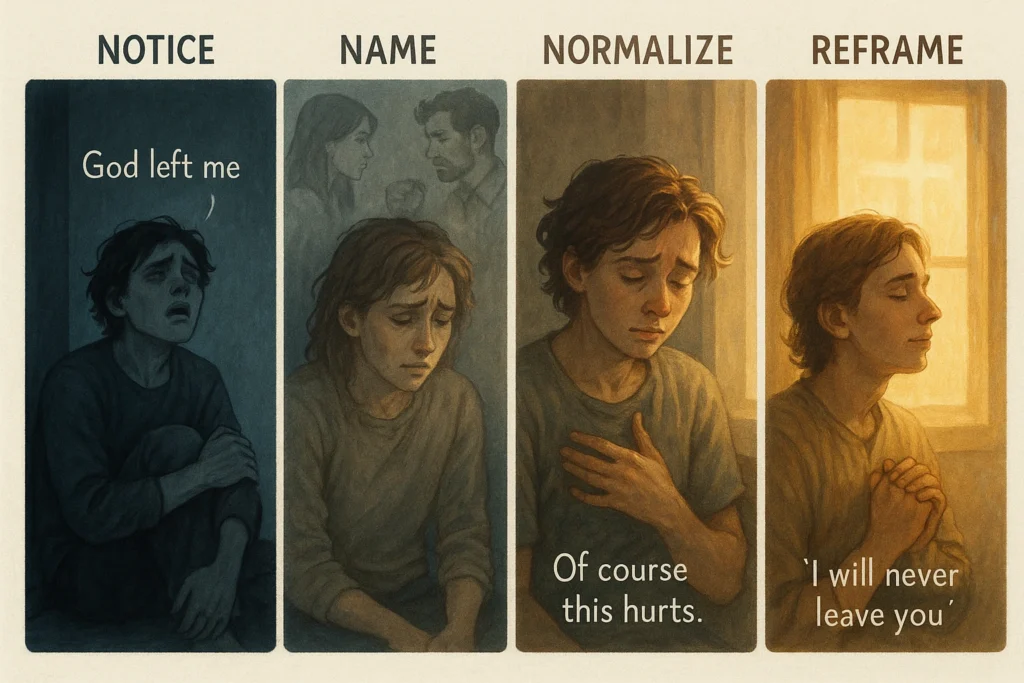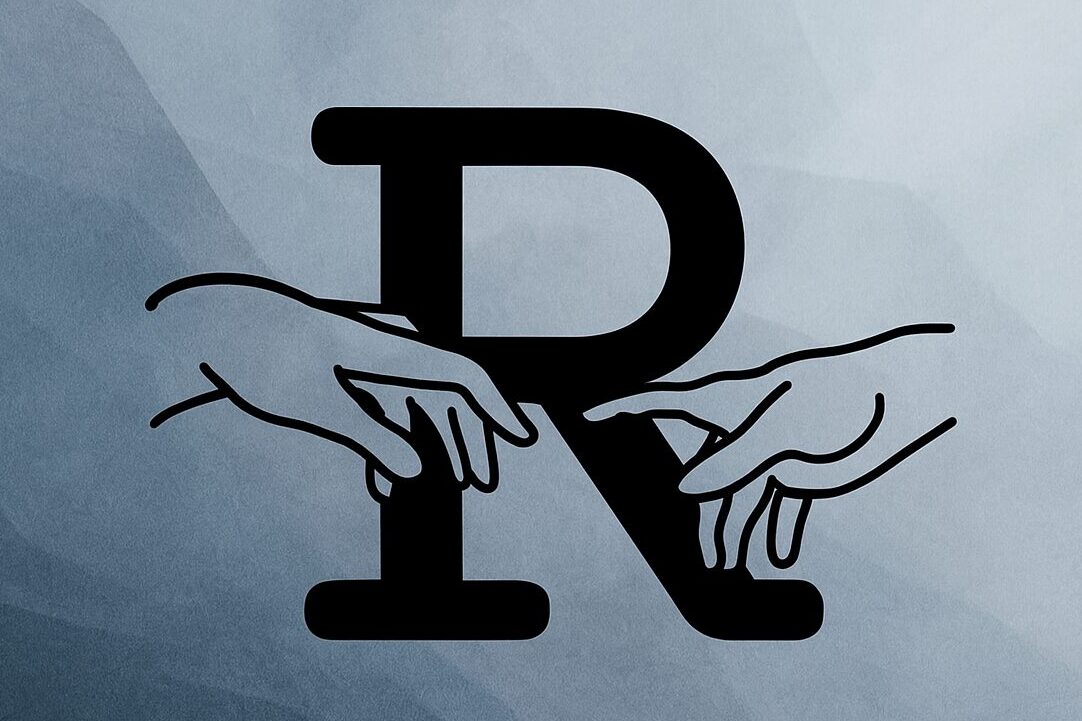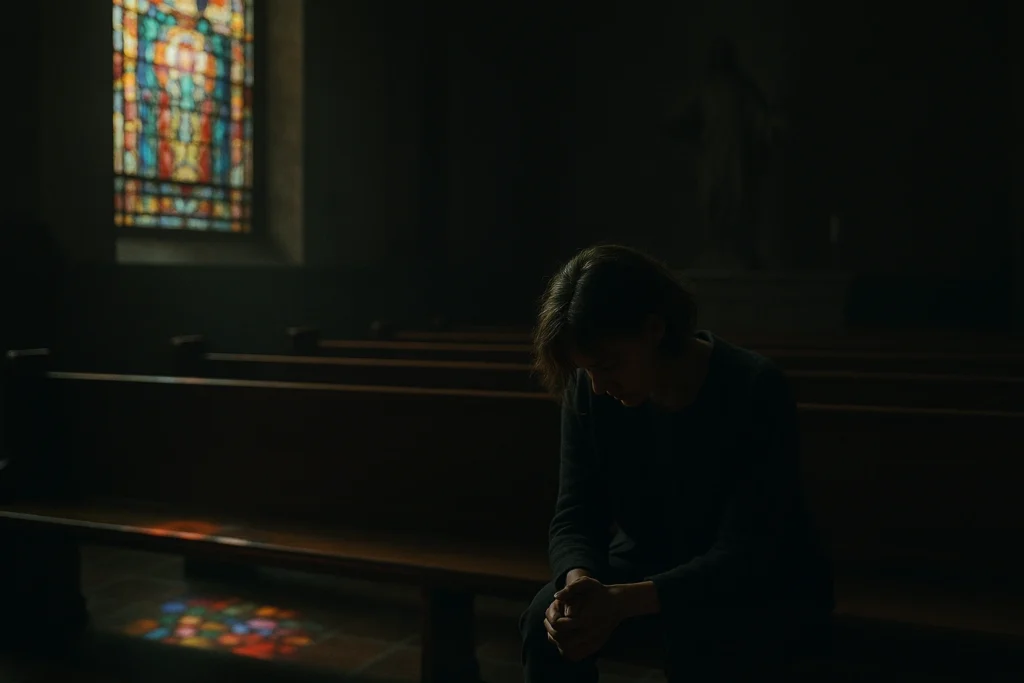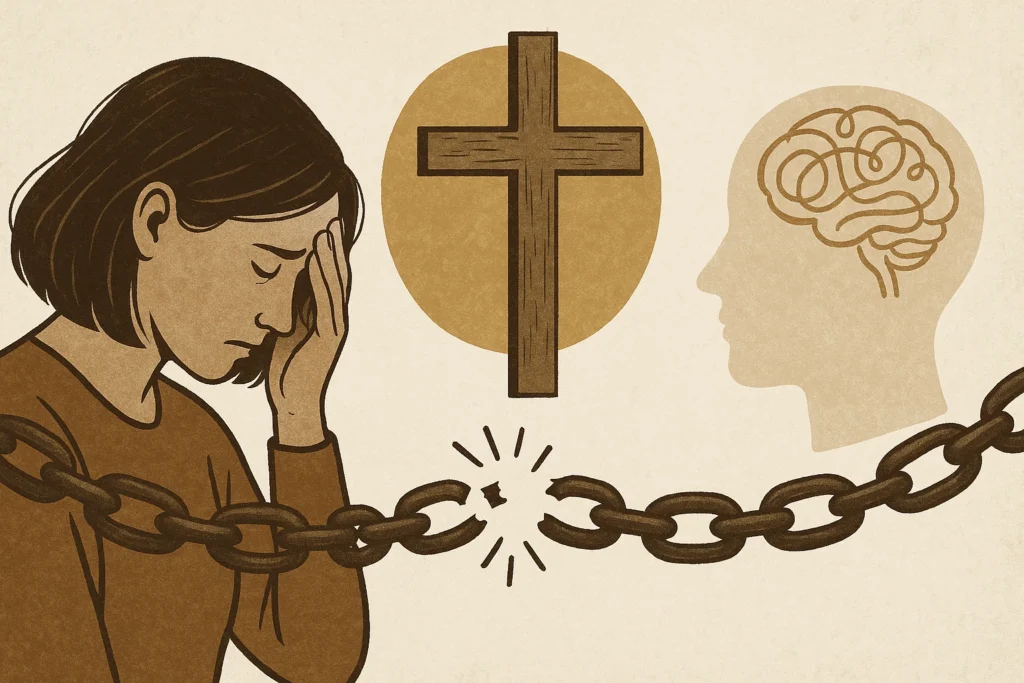Listen to Luke Johanni speak about this article on the Mind and Spirit Podcast!
When God Feels Far (Part 1): Explore how Catholic teaching and modern psychology together offer a path to healing.
Sometimes we project onto God the wounds other people left in us.
Welcome
Hey friends! Welcome back to Mind and Spirit, the podcast where Catholic faith meets psychology and we explore what real healing looks like. I’m Luke Johanni, your Catholic-integrated therapist—helping you bridge faith and mental health so you can find peace, purpose, and restoration.
Don’t forget to subscribe, follow @LukeJohanni on social media, and visit RestoredChristianCounseling.com to submit your questions—they might even be featured in a future episode.
Let’s dive in.
When the Heart Feels Forgotten
Have you ever prayed and felt… nothing? Like your words just dissolved into the air? You’ve tried to do everything right; follow God, love your family, be honest; and yet life keeps coming at you from every angle. You’re exhausted, confused, maybe even angry, and the quiet inside your prayer makes you wonder: Where is God? Did He give up on me?
Today, we are starting another a two-part series called When God Feels Far.
In Part 1, we’ll explore what it means to feel abandoned by God; when life’s pain or people’s failures make Him seem distant, and how those experiences shape the way we relate to Him. Then, in Part 2, we’ll move deeper into the mystery of the Dark Night of the Soul; which is a time when God’s voice grows quieter, not because He’s absent, but because He’s inviting us to surrender and trust Him in a new way.
So in this first part, we’re going to uncover why that sense of abandonment often begins, how it distorts our view of God, and how we can find our way back to the truth that He never abandons us. He’s always near; knocking at the door of our hearts.
We’ll approach this like we would in therapy: by honoring your pain, understanding how our minds interpret silence, and then re-grounding in what’s true. Together, we’ll weave Scripture and the wisdom of the Church throughout, because the human soul needs both clarity and compassion.
Today, we are going to uncover why that sense of abandonment often begins, how it distorts our view of God, and how we can find our way back to the truth that He never abandons us.

What Do I Mean by Abandonment
Abandonment is a core wound; a deep emotional injury that forms when our basic need for safety, love, or belonging isn’t met.
Core Wounds
From a therapeutic lens, abandonment is a core wound, which is a deep emotional injury that forms when our basic need for safety, love, or belonging isn’t met. These types of wounds don’t just hurt once; they can shape how we see ourselves and others.
Core wounds of abandonment come from the loss of safety, care, or responsiveness from someone we depended on. When that happens (whether in childhood, in marriage, or in friendship) our nervous system learns to brace for rejection. This is normal and human. But there is a danger that, over time, these patterns can start to shape how we see ourselves and even God.
Let me give you a few examples:
Core wounds of abandonment come from the loss of safety, care, or responsiveness from someone we depended on.
First
If your parents were unpredictable, then you’re nervous system may develop to expect that other people are unpredictable as well. Which logically, will lead to insecurity and difficulty trusting other people, including God.
Second
Maybe church friends judged or turned on you. This has the potential to cause unwarranted assumptions that God has turned on you too.
Third
One of the most common situations I run into is with devout Christian’s struggling when life throws them a curve ball. For instance, a devout, loving, charitable wife or husband, being cheated on or left by their spouse. The result often causes a crisis on mainly levels, including Faith. This crisis often leads to questioning. “I love God. I have been dedicated and true to God. Yet, he did not answer my prayers and my husband has left me. Why has he abandoned me?”
Learned Expectations
It’s what happens when we transfer the pain of real betrayal onto Him, when the wounds left by people make us suspicious of love itself.
These responses are what we call learned expectations. They make sense psychologically, because your mind and body are doing what they were trained to do; defend you and protect you from being hurt or placed in a moment of crisis again. If people have left you before, your brain learns to expect more leaving. You may start to question and even believe that God has gone silent or betrayed you too; due to the betrayal you have experienced from other people.
So, when God feels silent, those same alarm bells go off. But that’s not the whole story.
This first kind of “feeling abandoned by God” often isn’t about God being silent at all. It’s what happens when we transfer the pain of real betrayal onto Him, when the wounds left by people make us suspicious of love itself. God is still speaking, still near, but our insecurity builds walls around the heart that make His voice harder to hear.
And you’re not alone in this. People have wrestled with that same feeling for as long as man’s knowledge of God has existed. Scripture gives us powerful examples of men and women who faced real suffering, deep confusion, and yet refused to believe that God had truly left them.
The Story of Job: Faith Under Fire
Faith isn’t proven when everything makes sense. It’s proven when nothing does.
Let’s look at one of the clearest examples of this struggle in Scripture, the story of Job.
Job and his Struggle
His story is one of faith under fire. He was described as a devout and upright holy man, who then lost nearly everything in a series of devastating blows (Job 1–2): including the deaths of his children, loss of his wealth and even his health.
To make this worse, the people around him tried to make sense of his suffering. But their explanations only deepened his wounds. They told him, “You must have sinned. God must be punishing you.” Even his wife urged him to curse God and give up.
Job’s Response
Job was experiencing isolation on top of the grief of those he lost. An isolation of abandonment by the people who should have been his comforters. In that moment, Job could have done what so many of us do: take our losses, the rejection, and cruelty of others and project it onto God. He could have said, “If everyone else has turned on me, God must have too.” But he didn’t.
Instead, Job did something both raw and holy, he lamented. He cried out, he questioned, he wrestled, and he poured out his pain before God without pretending it didn’t hurt. But through it all, he never cursed God or turned away from God. And in the middle of his anguish, he grounded himself in what he knew to be true: and his words can speak to you and I not matter the storm we are weathering, “for I know that my Redeemer lives.” (Job 19:25)
Job’s Message
That one line changes everything. Job is saying, “Even when my life feels like proof that God has left me, I will not confuse what I feel with what is true.” He didn’t deny the pain. But he refused to let pain redefine who, he knew, God is.
And that’s the difference between lament and turning our pain onto our relationship with God.
Job’s Lament
Lament faces God with honest questions; while projection turns our pain against Him because we don’t know where else to put it. Job didn’t fake his faith. He brought his sorrow straight to God instead of letting it harden his heart into distancing itself from God.

Job’s Secure Attachment
Psychologically, that’s significant. Job models what we might call secure attachment, which is staying connected even when the relationship feels uncertain. Spiritually, it’s trust in motion. Job reminds us that feeling confused or angry isn’t the same as losing faith; it’s an invitation to bring our confusion to the One who can hold it.
Afterall, Faith isn’t proven when everything makes sense. It’s proven when nothing does.
And that’s where lament comes in. Lament is what kept Job tethered to God when everything around him was falling apart. It’s the language of a heart that refuses to go silent, even when it doesn’t understand. So, let’s talk about what that actually means.
What is Lament? What Does it Look Like?
That’s lament in action: truth and pain held together in the same breath.
Lament isn’t a lack of faith. It’s the expression of our faith in a raw and real way.
Defining Lament
The word lament literally means “to cry out in grief.” But biblically, it’s more than just crying. It’s crying to someone. It’s grief directed toward relationship. And it’s what happens when our hearts refuse to go silent, even when we don’t understand what God is doing.
What Lament Looks Like
When we lament, we don’t hide the pain or polish it up with the right words. It’s raw. We bring the pain honestly before God. It can sound something like: “Lord, this hurts so much. I don’t know what You’re doing, and I don’t even know what to pray anymore. I’m trying to hold on, but I feel like I’m falling apart. Where are You in this?”
This isn’t blasphemous or criticizing God. It’s real way to communicate with someone we are in a relationship with.
Scripture on Lament
And we see this all throughout Scripture. The book of Lamentations, written by the prophet Jeremiah, gives us a pattern to follow. He writes, “He has walled me about so that I cannot escape; He has made my chain heavy. Though I call and cry for help, He shuts out my prayer.” (Lamentations 3:7-8)
That’s raw and real. Jeremiah feels trapped, unheard, forgotten. But then, only a few verses later, he anchors himself again: “The steadfast love of the Lord never ceases; His mercies never come to an end; they are new every morning.” (Lamentations 3:22-23)
That’s lament in action: truth and pain held together in the same breath. It doesn’t deny your pain and hurt; it brings it into a dialogue with God; rooted in His truths and hope.
Therapeutic Perspective of Lament
From a therapeutic perspective then, lament is emotional honesty. It’s naming the pain instead of suppressing it.
- In Cognitive Behavioral Therapy (CBT) terms, it’s a kind of cognitive re-anchoring: which is acknowledging the thought or feeling and then bringing it back under the larger truth.
- In Acceptance and Commitment Therapy terms, it’s acceptance in relationship: making room for the emotion, letting it exist, and still choosing to stay connected to what you value most: your faith, your relationship with God, your commitment to love and truth.
Healing Trauma Through Lament
Lament is also what allows the body to begin calming after a crisis or trauma. When we hold grief in silence, our nervous system stays in crisis and on alert. But when we give sorrow words, especially words directed toward a loving God, it tells our body, “You are not alone in this.” That’s why lament can actually be healing; it integrates emotion and faith instead of forcing them to compete.
Healing Spirit Through Lament
Spiritually, lament is one of the holiest sounds heaven ever hears. It says, “I don’t understand You right now, but I am not walking away.” It’s the prayer that keeps our relationship alive, while we wait for His light to return.
Lament doesn’t push God away; it keeps the conversation alive long enough for hope to find its way back in.
But even when we hold on like that, the question still rises in us, “Why does God allow it? Why would a loving Father let His children walk through so much pain, loss, or silence?” Let’s talk about that.
Lament is one of the holiest sounds heaven ever hears.
Why Does God Allow Pain At All?
Our God is not indifferent to pain. He’s a God who bleeds. And because He entered it, He can transform it.
So, why does God allow bad things to happen to good people. That’s the question that always follows suffering, isn’t it? “If God is good… if He loves me… then why does He allow this?”
It’s a question as old as humanity, and one that’s echoed through Scripture and the hearts of every person who’s ever felt pain.
God’s Will
Let’s start here: God never wills evil. He never desires the suffering of His children. But in His love, He gave us something sacred and dangerous, free will. The ability to choose love also means the ability to reject it. And from the very beginning, humanity used that freedom to turn away. The result was a broken world where sin, injustice, and pain entered the story.
God in the Old Testament
When we read about judgment in the Old Testament, it’s not God delighting in pain. It’s God confronting what destroys His creation. Those moments of wrath are really the fire of love refusing to let evil have the final word. And that same fire would one day fall upon Himself at the Cross. So even when Scripture shows His justice, it’s always a justice ordered toward mercy.
So, when terrible things happen (abuse, betrayal, loss, violence) it isn’t because God wrote those things into your story. It’s because He refuses to strip us of the freedom that makes real love possible.
God’s love doesn’t cause our suffering. It actually enters it, to redeem what sin destroyed.
God and the Cross
We see this in the cross. The cross is not God’s explanation for suffering, it’s His participation in it. Think about Jesus on the Cross quoting Psalm 22: “My God, my God, why have You forsaken me?” But Psalm 22 doesn’t stop there. What begins as a cry of abandonment ends in trust; a reminder that even in our darkest moments, God remains steadfast and true.
In Jesus, God steps into the very pain we question Him about. He doesn’t stay distant; He suffers with us, and for us. That’s what makes Christianity unique. Our God is not indifferent to pain. He’s a God who bleeds. And because He entered it, He can transform it.
But let’s be honest: knowing that doesn’t always take the pain away. Even when we understand the theology, our hearts still ask, “Okay, but where is He now? Why doesn’t He stop this?”
What God Has Promised Us
He’s saying: I know it hurts. I’ve been there. And I’m not leaving you in it alone.
That’s where we have to remember what He did promise us, and what He didn’t. He never promised a life free from suffering. He promised His presence in it.
Jesus said, “In this world you will have trouble. But take heart; I have overcome the world.” (John 16:33)
He’s not denying our pain, but reassuring that He will transform our suffering. He’s saying: I know it hurts. I’ve been there. And I’m not leaving you in it alone.
From a therapeutic perspective, this matters deeply. Because when you’ve been hurt or abandoned, your brain learns to associate pain with danger, and love with risk. So when life hurts again, it’s easy to assume that God, too, has stepped back. But that reaction comes from old wounds, not from God’s heart. In reality, He hasn’t withdrawn; our fear just makes it harder to recognize His presence.
Finding Meaning in the Midst of Pain
As Christians, the meaning in our suffering isn’t abstract. It’s redemptive. That is, it’s knowing that our suffering, united with Christ’s, can bear fruit we can’t yet see.
In Acceptance and Commitment Therapy, we talk about the tension between pain and our values; which is how meaning allows us to endure what otherwise feels unbearable.
Viktor Frankl, a Jewish psychologist who survived the Holocaust, wrote, “In some way, suffering ceases to be suffering at the moment it finds a meaning.”
Pain’s Meaning As Christians
As Christians, the meaning in our suffering isn’t abstract. It’s redemptive. That is, it’s knowing that our suffering, united with Christ’s, can bear fruit we can’t yet see.
So when life collapses, when the cancer diagnosis comes, when the prayer to save a loved one doesn’t seem answered, when you feel completely unseen and unheard; the question isn’t, “Why did God abandon me?” The question becomes, “How might God still be present here? What good is He working to bring out of what sin has tainted?”
It’s essential to remember, God doesn’t authors our pain. Rather, He refuses to let it have the final word.
God Redeeming Our Pain
And sometimes His work is invisible, not because He’s hiding, but because He’s healing what pain distorted.
- He’s teaching your heart to trust love again.
- He’s softening the fear that told you to brace for rejection.
- He’s rebuilding your ability to feel safe in His presence, even when life still hurts.
That’s restoration at work; not in the absence of suffering, but in the places where it once lived.
Allowing God into Our Pain
And that’s the kind of faith Job had. That’s the kind of faith Christ modeled. A faith that doesn’t minimize suffering, but let’s God meet us in it.
Even when we know these truths, our hearts and minds don’t always catch up right away. The pain still feels real, the silence still feels personal. That’s where therapy can help because sometimes what feels like spiritual distance is actually our nervous system and thought patterns replaying old wounds.

Psychology of Feeling Abandoned by God
It’s the mind doing what it was trained to do, that is protect you from pain by creating distance before you’re hurt again.
Past Wounds Resulting in Feeling Abandoned
In the therapy room, I see it all the time, and maybe you’ve seen it in yourself too:
- Trigger: Life collapses, a prayer feels unanswered, or the quiet stretches too long.
- Automatic thought: “God left me.”
- Feeling: Fear, shame, anger, despair.
- Behavior: Pulling away from prayer, from church, from people who love you.
This pattern makes sense. It’s the mind doing what it was trained to do, that is protect you from pain by creating distance before you’re hurt again. But healing begins when we slow that story down and look at it with gentleness and truth.
Notice, Name, Normalize, Reframe
In Cognitive Behavioral Therapy, I often use a simple rhythm: Notice, Name, Normalize, and Reframe.
- Notice the thought: “God left me.”
- Name the trigger: a loss, a betrayal, a long silence in prayer.
- Normalize the reaction: “Of course this hurts. Anyone who’s been wounded would feel shaken.”
- Reframe with truth: “My feelings are loud, but they’re not the end of all. Scripture says He will never forsake me” (Deuteronomy 31:6; Isaiah 49:15).
And remember Job: he felt utterly desolate, yet still grounded himself in truth: “I know that my Redeemer lives.” (Job 19:25)
When you practice this, you’re not ignoring your emotion; you’re naming it and bringing it back under truth. You’re teaching your heart and your nervous system that pain doesn’t mean abandonment.

Now What Do We Do?
You may feel abandoned, but you’ve never been alone.
So what do we do when God feels far? When the prayers feel empty, when the silence gets heavy, and our hearts start to whisper, “He’s betrayed you, abandoned you, does not care for you”?
The first thing is this; don’t rush to fix the feeling. Healing doesn’t start by pretending you’re fine; it starts by being honest. You don’t have to put on a false face of faith for God. You just have to show up as you are.
4 Steps for Drawing Closer to God
So here are a few ways we begin that slow, sacred work of restoring trust.
1. Be Honest In Prayer
Don’t suppress your emotions, express them to our Heavenly Father. You can’t heal what you hide. God already knows your thoughts, but He invites you to bring them to Him anyway. So speak freely. Cry. Question. Even if your prayer sounds like Job’s: “I don’t understand You right now, but I’m not walking away.” That’s faith in action. And this is letting your emotions exist without judgment, and bringing them into relationship with God instead of avoidance.
2. Reframe the Story
When abandonment thoughts show up “God left me,” “I’m alone again,” pause and walk through the steps we talked about: Notice it. Name what triggered it. Normalize the pain. Then reframe it with truth. You might pray, “My heart feels abandoned, but that’s not who You are. You promised never to leave me.” Remind yourself of Scripture: “I will never leave you nor forsake you.” (Deuteronomy 31:6) This isn’t just think positively. It’s retraining your mind to align with what’s actually true.
3. Rebuild Safety Through Connection
Abandonment isolates us, so healing has to include relationship (with God and with people.) That might mean returning to community, or talking with a therapist, spiritual director, or trusted friend. When you let yourself be seen, even in weakness, you create new evidence for yourself that the Father’s love is unending. And as a little therapeutic tip: Every time you stay in connection when it feels safer to withdraw, your nervous system learns that love can be trusted again.
4. Choose a Small Act of Love
Pick one act that embodies who you want to be: a 5-minute prayer, a text to encourage a friend, a quiet work of mercy. Do it even if you feel nothing. Why does this help? It separates and identifies the difference between faithfulness and feelings. And it builds a “muscle memory” focused on faithfulness for our spiritual life.
When you practice these steps, remember you’re not trying to prove anything or earn closeness with God; you’re learning to see what has always been there. God hasn’t moved away; you’re just clearing the fog that pain left behind.
And that’s where I want to leave you today: with the reminder that you are not forgotten. The same God who met Job in his ashes and Jeremiah in his tears will meet you in your silence too. Because He doesn’t just make the promise to be true, He keeps it.
You may feel abandoned, but you’ve never been alone.
A Closing Invitation
Before we close, I want to set up where we’re headed next. Today we talked about perceived abandonment; when pain and old wounds make God feel far, even though He hasn’t moved. We looked at how faith and therapy work together to help us rebuild trust and recognize His presence again.
But there’s another kind of abandonment the saints describe: a silence that isn’t rejection, but an invitation. They called it the Dark Night of the Soul: a season when God seems to withdraw the feeling of His presence to draw us into deeper trust. Think of St. John of the Cross or St. Teresa of Calcutta, who endured years of interior dryness yet remained faithful in love.
In the first kind of silence, God waits for us to accept Him. In the second, He invites us into deeper relationship.
Next Time
Next time, we’ll talk about that kind of darkness, how to tell the difference between the Dark Night and depression, and how to walk through both with wisdom and hope.
Remember
When life hurts, it’s easy to assume that God, too, will abandon us. But that reaction comes from old wounds, not from God’s heart. In reality, He hasn’t withdrawn; our fear just makes it harder to recognize His presence.
Prayer
Let’s Pray
Lord Jesus, for everyone listening who feels alone; meet them in the silence. Teach us to lament honestly and to trust deeply. When our hearts say, “Where are You?”, remind us: Our Redeemer lives. Amen.
Closing
Thanks so much for spending this time with me on Mind and Spirit. If today’s episode spoke to you, don’t rush past it. Take a quiet moment to breathe and let God meet you right where you are.
If this episode encouraged you, I’d love for you to subscribe, leave a review, and share it with someone who might need it. Your support not only helps this show grow. It helps more people find hope and healing through faith.
To connect with me personally, follow and message me on Instagram @LukeJohanni, or visit RestoredChristianCounseling.com for more resources.
And if you have a question you’d like me to answer in a future episode, just head to the Podcast page on my website and submit it. I’d love to hear from you.
I’m Luke Johanni, and this has been Mind and Spirit. Until next time, may the peace of Christ be with you.
Sources/Resources
- Book of Job 1-2; 19:25
- Psalm 22
- Lamentations 3:7-8; 22-23
- John 16:33
- Deuteronomy 31:6
- Isaiah 49:15
- Faith tested in darkness – Catechism of the Catholic Church 164-165
- God permits darkness for greater trust – CCC 272-274
- Dark Night of the Soul – St. John of the Cross
- Come Be My Light – St. Teresa of Calcutta
- APA Dictionary of Psychology
- ACT Therapy – Contextual Science Association
- CBT Therapy – NAMI.org
- Man’s Search for Meaning — Viktor E. Frankl
How Porn Hijacks Your Life (and How to Break Free)
Authentic Masculinity: Strength Ordered To Love
The Silent Struggle of Men: Finding a New Strength
When God Feels Far: Why You Feel Abandoned and How to Find Him Again (Part 2)
When God Feels Far: Why You Feel Abandoned and How to Find Him Again (Part 1)
Healing Trauma: With Psychology and Faith (Part 2)
Healing Trauma: With Psychology and Faith (Part 1)
Healing Scrupulosity and OCD: A Proven Path of Faith
The Truth About Anxiety: One Size Doesn’t Fit All
Breaking Free from Shame: The Power of Faith and Psychology
Mind and Spirit: From Brokenness to Calling

Have a question? Want it answered?
Submit your question below and it maybe answered on the Mind and Spirit Podcast and in this Blog. If you’d like a personal email response, please include your email.*
*Please note: Submitting a question through this form does not constitute therapy, nor is it intended to. It does not establish or initiate a therapeutic relationship. Learn more in our Privacy Policies.
Follow me on Instagram and Facebook or subscribe to the blog for weekly encouragement.












